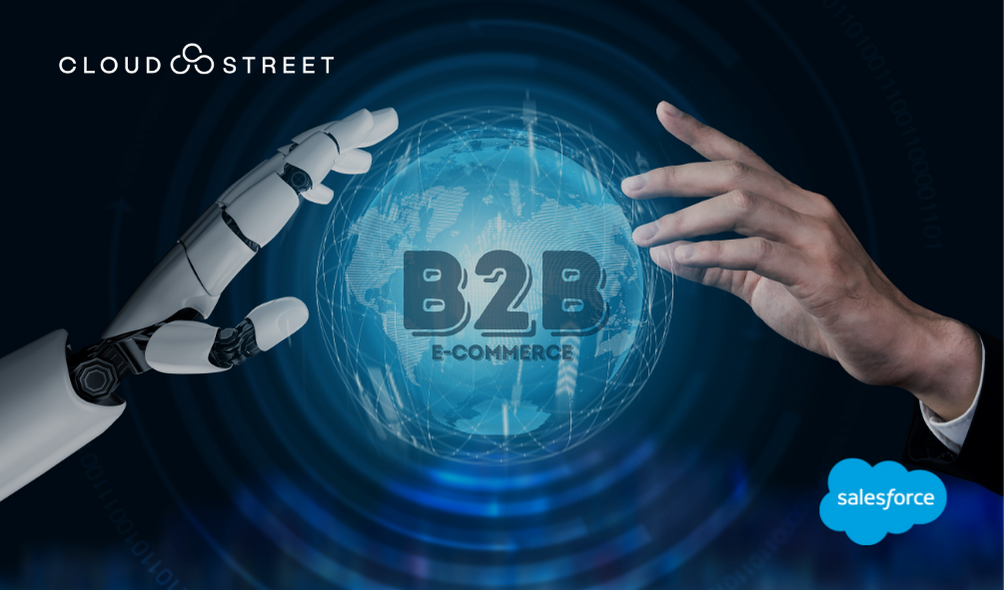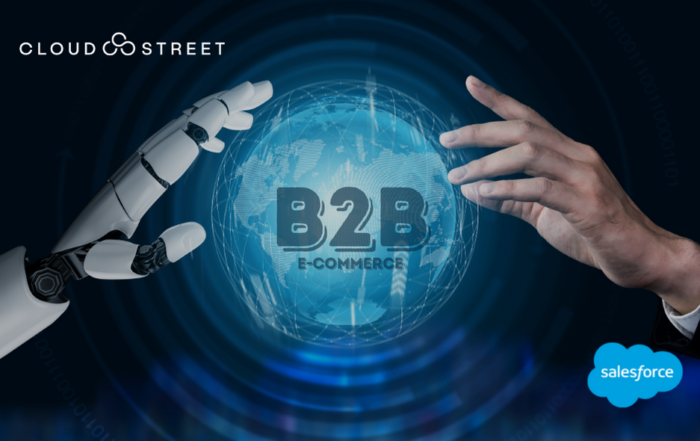
According to one recent study, approximately 35% of all global companies use artificial intelligence in some capacity as of 2023 – a trend that shows absolutely no signs of slowing down anytime soon. All told, the global AI market is anticipated to reach an enormous $1.85 trillion in size by as soon as 2030.
In a relatively short amount of time, things have already reached a point where it seems like new companies touting some “innovative AI product or service” are cropping up daily. It’s already difficult for even established companies to stand out in a crowded field – to say nothing of how significant the challenge is when everyone is focused on essentially the same topic, as is true with AI.
Salesforce in particular is focusing its attention on using artificial intelligence to improve things for both B2B buyers and sellers everywhere. It did this by way of the Salesforce Commerce Cloud platform – a powerful suite that aims to help B2B enterprises everywhere get more efficient, increase revenue, and more by leveraging the full might of AI and big data to their advantage.
Breaking Down the AI Pillars of Salesforce Commerce Cloud
All told, Salesforce Commerce Cloud is made up of five distinct applications that are built on a solid foundation of artificial intelligence. The first of these takes the form of the Einstein Copilot for B2B buyers. This allows ecommerce stores to let their buyers use plain-language prompts and photos to learn more about new products, to get personalized recommendations, and more. Essentially, it’s a conversational AI assistant that gives buyers the ability to have more direct, nuanced conversations than they could on virtually any other digital channel.
Another one of the applications that make up the Salesforce Commerce Cloud involves AI-driven goal-setting and recommendation. This is geared towards sellers, allowing them to set their own unique growth targets and goals based on a larger strategy. Once in place, sellers can get AI-powered recommendations that are generated via the Salesforce Data Cloud. Salesforce will use your own data to not only tell you what is possible, but how to go about accomplishing it in the most effective way possible.
Salesforce Commerce Cloud now also offers generative SEO metadata optimization as well. The Einstein AI platform will provide sellers with search engine optimization recommendations so that they can make sure their product titles, descriptions, and other text-based elements are always built with sites like Google in mind. When you consider that the vast majority of all online interactions between a business and its customers still begin with a search engine, it’s easy to see why this is one step that you don’t want to overlook. SEO optimization is nothing if not time-consuming, however, which is a major pain point that Salesforce’s Einstein AI platform wants to address.
Thanks to Commerce Cloud it is now also possible to leverage enterprise scale carts and split segments. Buyers can now add up to 2,000 different line items in a single online shopping cart, supporting the types of large-volume transactions that would have been impossible even as recently as a few years ago. But more than just a minor convenience, enterprise scale carts let buyers split single orders into multiple delivery addresses on an as-needed basis. They can even change shipping speeds for different components of the order based on whatever their current distribution needs are.
Finally, Salesforce Commerce Cloud now offers native merchant services. Processes like integrated shipping, tax, and even checkout are all brought together under one roof. This makes it easier for sellers to get their commerce stores up and running, while also allowing them to focus more of their attention on creating better experiences for customers. Historically, getting these critical integrations working with outside applications has been equal parts frustrating and time-consuming. Now, Salesforce has eliminated a major obstacle.
Ultimately, these five features are merely a beginning for what Salesforce Commerce Cloud will eventually offer. They also serve as further examples of the interesting, forward-thinking, and ultimately secure applications that AI has in many facets of business.
The AI Era: Harnessing Automation to Your Advantage
This all comes during a time when B2B ecommerce sales in particular continue to defy expectations. According to one recent study, the sector saw a 17% year-over-year growth in 2023 alone.
Salesforce itself continues to enjoy tremendous success – this despite the fact that it seems like new competitors are cropping up daily, particularly in the AI space. In February 2024, Salesforce indicated that it had experienced an 11% year-over-year growth itself, hitting 34.8 billion in revenue. Of the many factors that contributed to this rise, Salesforce representatives indicated that their ongoing investment in the development of artificial intelligence and related solutions played a big role in it.
CLOUDSTREET is an example of an organization that has implemented B2B stores for a wide range of different clients using Commerce Cloud functionality. This includes those manufacturers not only in the general industrial field, but also in IT services, and consumer goods as well. CLOUDSTREET offers two distinct Accelerator packages for clients to choose from, both of which help with getting a store online so that selling can begin just as quickly. All told, they’re viable ways to increase sales from existing buyers while also embracing the convenience of having your own custom portal.
In the end, it’s important to acknowledge that the conversation surrounding artificial intelligence is only going to ramp up as time goes on. As the technology becomes more powerful and more ubiquitous, it is going to have an indelible impact on virtually every industry you can name. Ecommerce is certainly no exception. The events of the last few years have already changed the way people shop online forever – now, artificial intelligence seems poised to take those gains to the next level.
To their credit, Salesforce seems to be attempting to cut through the noise to help B2B ecommerce organizations unlock not just the potential of artificial intelligence, but the reality of it. In terms of Commerce Cloud, the generative SEO metadata optimization alone can return literally hours of productivity back to an entrepreneur. But when you also consider native merchant services and AI-driven goal-setting and recommendations, you’re quickly looking at an opportunity that is far too important to pass up.
But Commerce Cloud is also a perfect example of an AI tool that isn’t just by entrepreneurs for entrepreneurs. Einstein Copilot and features like enterprise scale carts also create better experiences for B2B shoppers, which in and of itself is the most important advantage of all.


